BAROMETER TAPPING AT THE TREASURY
By NICHOLAS DAVENPORT
WHAT are the chances of more restrictive action being taken by " the Treasury? Ican imagine Mr.
)Amory tapping his economic barometers each morning and trying to make up his mind, These barometers are something very special to the Treasury, be- ing seasonally adjusted, and this is how Mr. Amory has been reading them, according to his latest Bulletin. Industrial production—rising but not so fast (up 2 per cent. on the last quarter of 1959). Retail sales—rising (up 1 per cent). Un- employment—falling: unfilled vacancies—rising (341,000 are out of work and nearly as many- 327,000—are wanted. This is most unseasonal 4. nd inflationary). Exports—rising (up 2 per cent. in the February-April period): imports—rising (up 21 per cent.), but not so sharply as in the
previous three months (when the rise was 74 per cent.). The Chancellor tapped the last two baro- meters again for the recent meeting of the National Production Advisory Council and said that he was not yet satisfied that there was a reasonable balance between the two. It was no good, he said, so loading the industrial system with home demands that new export orders could not be taken except with long and unacceptable delivery dates. This seemed to suggest that more measures of restraint were coming.
The National Institute of Economic and Social Research makes light of the Chancellor's fears in its last (May) bulletin. Imports, it says, can hardly go on rising as fast as they have done in the last six months. If they did, it would mean 4 quite unprecedented build-up of stocks of imported materials which there is no reason to expect. Exports should continue to rise—over the year they think by about 7 per cent.—seeing that
orders in hand rose appreciably in the first quar- ter, especially in the engineering and electrical industries which account for nearly half the total volume of exports. These forecasts of the National Institute experts tend to be more light- hearted than those of the Treasury experts, who might lose their jobs if they were wrong, but they are a very useful antidote to Mr. Amory's tradi- tional caution.
The key barometers which will finally make the Chancellor decide what action to take are labelled 'Price Level—Don't Tap' and 'Balance of Pay- ments—Tap for Reserves.' As for the first, the NIESR actually seems to be more alarmist than Mr. Amory. There is nothing to fear, it seems, from the side of import prices but from the actions of trade unionists and industrialists. The NIESR believes that the reduction of working hours in the engineering industry will raise the wage bill by 41 per cent. to 5 per cent. In some industries (e.g. chemicals) there will be compen- satory rises in productivity, but on the whole the national bill for wages and salaries will go up quite rapidly—perhaps by 6 per cent. by the end
of the year. Reports that the industrialists have been raising prices since the wage round have been confirmed to some extent, they say, by the indices of April wholesale prices. So they expect retail prices to rise a point or two, unless food prices go on falling, and break the long spell of stability. Is this why Mr. Amory wants to retire?
As for the balance of payments, the NIESR believes, on the assumption that from now on the rise in imports will slow down more than the rise in exports, that the position will improve after two bad quarters and that for 1960 as a whole the surplus will remain around £145 million. With the oil companies cutting back their capital spending, private investment abroad should be less this year but government lending will be larger, so that on balance we will probably have another deficit on capital account. Last year the reserves were cushioned against the effect of the deficit because sterling countries ran up their sterling balances here by £184 million, but this is unlikely to be repeated. The barometer may therefore point, after some tapping, to a fall in the reserves. The May figures (to be announced as we go to press) may be a test.
It looks as if Mr. Amory will, before long, take more restrictive or protective action, but what? If he is wise he will go to the root of the trouble, which is the motor industry. The import bill is now being swollen, as the NIESR points out, not only by imports of sheet steel but by imports of small cars. (In the heart of the country I see my local garage selling Dauphine cars like hot cakes to people who are tired of waiting for the British.) Hire-purchase restraints are not enough: it will have to be higher purchase taxes for the time being. (Import quotas are out of the question- unless we want to declare war on the Common Market Six.) If the Chancellor were to announce that the higher purchase tax would stay on only until the new capacity of the motor industry comes into production the effect on home sales -and the import ,bill-would be immediate.
But what the Chancellor must not do is to try to restrict home sales by dearer money. It would not have the desired effect: it would have many undesirable effects-some of them inflationary. Take housing, for example. The Treasury has just reviewed in Economic Trends the first four years of the new index of retail prices. The chart of the various groups making up the index shows that housing, which accounts for 8.7 per cent. of the total weight, is the only group with a dangerous rising trend. This was not due to de- control-council houses were not subject to the Rent Restriction Acts-but to the rising rate of interest. An extra 1 per cent. on a four-bedroom house is equivalent to another 10s. in the weekly rent. There is not the 'slightest reason why Mr. Amory should not insulate public investment in housing against the rise in the market rate of interest. All he has to do is to bring local council borrowing for houses back into the Local Loans Fund and apply a special rate of interest. There would be no harm in this veiled subsidy, provided he has absolute control over the amount of housing to be undertaken. I have so far preached this doctrine to deaf ears, but could not Mr. Amory, before he leaves the Treasury, listen to the voice of reason?



































 Previous page
Previous page